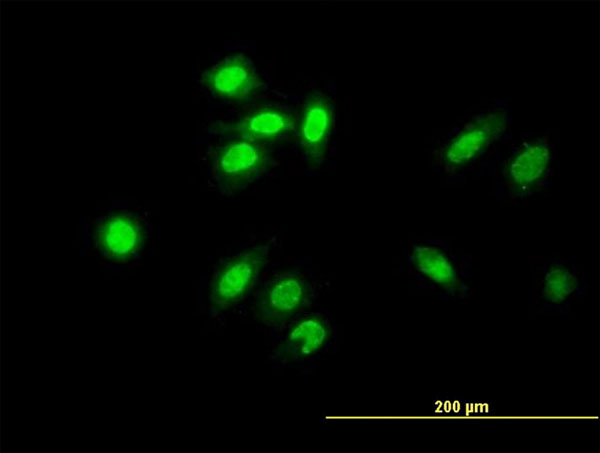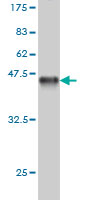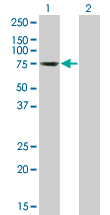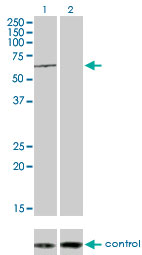TESK2 Antibody (monoclonal) (M01)
Mouse monoclonal antibody raised against a partial recombinant TESK2.
- SPECIFICATION
- CITATIONS
- PROTOCOLS
- BACKGROUND

Application
| WB, IF |
|---|---|
| Primary Accession | Q96S53 |
| Other Accession | BC033085 |
| Reactivity | Human |
| Host | mouse |
| Clonality | Monoclonal |
| Isotype | IgG1 Kappa |
| Clone Names | 1A8 |
| Calculated MW | 63639 Da |
| Gene ID | 10420 |
|---|---|
| Other Names | Dual specificity testis-specific protein kinase 2, Testicular protein kinase 2, TESK2 |
| Target/Specificity | TESK2 (AAH33085, 405 a.a. ~ 542 a.a) partial recombinant protein with GST tag. MW of the GST tag alone is 26 KDa. |
| Dilution | WB~~1:500~1000 IF~~1:50~200 |
| Format | Clear, colorless solution in phosphate buffered saline, pH 7.2 . |
| Storage | Store at -20°C or lower. Aliquot to avoid repeated freezing and thawing. |
| Precautions | TESK2 Antibody (monoclonal) (M01) is for research use only and not for use in diagnostic or therapeutic procedures. |

Thousands of laboratories across the world have published research that depended on the performance of antibodies from Abcepta to advance their research. Check out links to articles that cite our products in major peer-reviewed journals, organized by research category.
info@abcepta.com, and receive a free "I Love Antibodies" mug.
Provided below are standard protocols that you may find useful for product applications.
Background
This gene product is a serine/threonine protein kinase that contains an N-terminal protein kinase domain that is structurally similar to the kinase domains of testis-specific protein kinase-1 and the LIM motif-containing protein kinases (LIMKs). Its overall structure is most related to the former, indicating that it belongs to the TESK subgroup of the LIMK/TESK family of protein kinases. This gene is predominantly expressed in testis and prostate. The developmental expression pattern of the rat gene in testis suggests an important role for this gene in meitoic stages and/or early stages of spermiogenesis.
References
Diversification of transcriptional modulation: large-scale identification and characterization of putative alternative promoters of human genes. Kimura K, et al. Genome Res, 2006 Jan. PMID 16344560.The status, quality, and expansion of the NIH full-length cDNA project: the Mammalian Gene Collection (MGC). Gerhard DS, et al. Genome Res, 2004 Oct. PMID 15489334.Complete sequencing and characterization of 21,243 full-length human cDNAs. Ota T, et al. Nat Genet, 2004 Jan. PMID 14702039.Generation and initial analysis of more than 15,000 full-length human and mouse cDNA sequences. Strausberg RL, et al. Proc Natl Acad Sci U S A, 2002 Dec 24. PMID 12477932.Binding of 14-3-3beta regulates the kinase activity and subcellular localization of testicular protein kinase 1. Toshima JY, et al. J Biol Chem, 2001 Nov 16. PMID 11555644.
If you have used an Abcepta product and would like to share how it has performed, please click on the "Submit Review" button and provide the requested information. Our staff will examine and post your review and contact you if needed.
If you have any additional inquiries please email technical services at tech@abcepta.com.













 Foundational characteristics of cancer include proliferation, angiogenesis, migration, evasion of apoptosis, and cellular immortality. Find key markers for these cellular processes and antibodies to detect them.
Foundational characteristics of cancer include proliferation, angiogenesis, migration, evasion of apoptosis, and cellular immortality. Find key markers for these cellular processes and antibodies to detect them. The SUMOplot™ Analysis Program predicts and scores sumoylation sites in your protein. SUMOylation is a post-translational modification involved in various cellular processes, such as nuclear-cytosolic transport, transcriptional regulation, apoptosis, protein stability, response to stress, and progression through the cell cycle.
The SUMOplot™ Analysis Program predicts and scores sumoylation sites in your protein. SUMOylation is a post-translational modification involved in various cellular processes, such as nuclear-cytosolic transport, transcriptional regulation, apoptosis, protein stability, response to stress, and progression through the cell cycle. The Autophagy Receptor Motif Plotter predicts and scores autophagy receptor binding sites in your protein. Identifying proteins connected to this pathway is critical to understanding the role of autophagy in physiological as well as pathological processes such as development, differentiation, neurodegenerative diseases, stress, infection, and cancer.
The Autophagy Receptor Motif Plotter predicts and scores autophagy receptor binding sites in your protein. Identifying proteins connected to this pathway is critical to understanding the role of autophagy in physiological as well as pathological processes such as development, differentiation, neurodegenerative diseases, stress, infection, and cancer.





